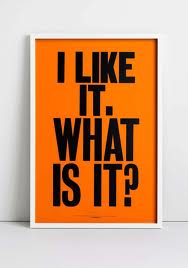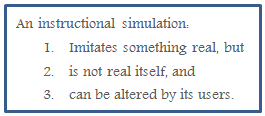What are Instructional Simulations?
 Image from: dogwalkmusings.blogspot.com
Image from: dogwalkmusings.blogspot.com
"Simulations are instructional scenarios where the learner is placed in a "world" defined by the teacher. They represent a reality within which students interact. The teacher controls the parameters of this "world" and uses it to achieve the desired instructional results." (Saskatoon Public Schools, 2009)
Instructional simulations allow for learning to take place within a context parallel to how the learners will apply the knowledge in their own lives. It helps to extend the learning from the classroom and into the real world.
"The key element that differentiates instructional simulations from other pedagogies is the formal specification of a conceptual structure with which students interact to learn about relationships between concepts." (serc.carleton.edu)
When students use a model of behavior to gain a better understanding of that behavior, they are doing a simulation. For example:
Instructional simulations cannot be passive learning. Students are required to be active participants in the simulation. They must anticipate outcomes and formulate questions and theories.
History of Instructional Simulations
Instructional simulations were first pioneered by the military and were popular in the United States school systems of the 1960's. Although the "back to basics" movement soon squashed their use, simulations today hold renewed interest with the current power and flexibility of computer technology.
- When students are assigned roles as buyers and sellers of a product and they are asked to conduct business transactions for the particular product. In this example, students are learning about market behavior by simulating the market.
Instructional simulations cannot be passive learning. Students are required to be active participants in the simulation. They must anticipate outcomes and formulate questions and theories.
History of Instructional Simulations
Instructional simulations were first pioneered by the military and were popular in the United States school systems of the 1960's. Although the "back to basics" movement soon squashed their use, simulations today hold renewed interest with the current power and flexibility of computer technology.

"You cannot teach a man anything - only help him find it for himself." - Galileo
How Effective are Instructional Simulations as an Instructional Strategy
In a research study performed by John Kenworthy and Annie Wong (Developing Managerial Effectiveness: Assessing and Comparing the Impact of Development Programs Using a Management Simulation or a Management game), they found that simulations and games are more effective at transferring learning to students than case studies. Other studies such as An Assessment of the Effectiveness of Simulation as an Instructional System in Food Service also concluded that simulations improve learning.
Often simulations are used as an exercise for students to apply what they have learned during a lecture. Researchers Anderson and Lawton in their study, Is Simulation Performance Related to Application? found a strong relationship between the number of concepts students used in a marketing class and their peformance in a simulation. . Other studies have dound that, measured by their grade on a final exam, students who played simulations during a course performed significantly better than those who did not.
In a research study performed by John Kenworthy and Annie Wong (Developing Managerial Effectiveness: Assessing and Comparing the Impact of Development Programs Using a Management Simulation or a Management game), they found that simulations and games are more effective at transferring learning to students than case studies. Other studies such as An Assessment of the Effectiveness of Simulation as an Instructional System in Food Service also concluded that simulations improve learning.
Often simulations are used as an exercise for students to apply what they have learned during a lecture. Researchers Anderson and Lawton in their study, Is Simulation Performance Related to Application? found a strong relationship between the number of concepts students used in a marketing class and their peformance in a simulation. . Other studies have dound that, measured by their grade on a final exam, students who played simulations during a course performed significantly better than those who did not.

